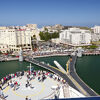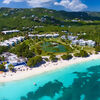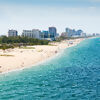14 Nights | Transatlantic
You will visit the following 5 places:

Haiti
Haiti is a sovereign state in the Western Hemisphere (North America). The country is located on the island of Hispaniola, in the Greater Antilles archipelago of the Caribbean. It also includes various offshore islands; the most popular islands are: the island of Tortuga (Île de la Tortue), Gonâve Island and Île à Vache (Cow Island), a lush island with many beautiful sights, located off the tip of southwestern Haiti. Though it’s still recovering from a 2010 earthquake, many of Haiti's landmarks dating to the early 19th century remain intact.

San Juan
San Juan, officially Municipio de la Ciudad Capital San Juan Bautista (Municipality of the Capital City, Saint John the Baptist), is the capital and most populous municipality in Puerto Rico, an unincorporated territory of the United States. As of the 2000 census, it has a population of 658,304 making it the 42nd-largest city under the jurisdiction of the United States. San Juan was founded by Spanish colonists in 1521, who called it Ciudad de Puerto Rico ("Rich Port City"). Puerto Rico's capital is the second oldest European-established city in the Americas, after Santo Domingo, in the Dominican Republic. Several historical buildings are located in San Juan; among the most notable are the city's former defensive forts, Fort San Felipe del Morro and Fort San Cristóbal, and La Fortaleza, the oldest executive mansion in continuous use in the Americas.

Southampton
Southampton is the largest city in the county of Hampshire on the south coast of England, and is situated 120 kilometres (75 mi) south-west of London and 30 kilometres (19 mi) north-west of Portsmouth. Southampton is a major port and the closest city to the New Forest. It lies at the northernmost point of Southampton Water at the confluence of the River Test and River Itchen, with the River Hamble joining to the south of the urban area. The local authority is Southampton City Council, which is a unitary authority. Just over a quarter of the jobs available in the city are in the health and education sector. A further 19 per cent are property and other business and the third largest sector is wholesale and retail, which accounts for 16.2 percent. Between 1995 and 2004, the number of jobs in Southampton has increased by 18.5 per cent. Southampton has always been a port, and the docks have long been a major employer in the city. In particular, it is a port for cruise ships; its heyday was the first half of the 20th century, and in particular the inter-war years, when it handled almost half the passenger traffic of the UK. Today it remains home to luxury cruise ships, as well as being the largest freight port on the Channel coast and fourth largest UK port by tonnage, with several container terminals. Unlike some other ports, such as Liverpool, London, and Bristol, where industry and docks have largely moved out of the city centres leaving room for redevelopment, Southampton retains much of its inner-city industry.

Saint Thomas Island
Saint Thomas is an island in the Caribbean Sea and with the islands of Saint John, Saint Croix, and Water Island a county and constituent district of the United States Virgin Islands (USVI), an unincorporated territory of the United States. Located on the island is the territorial capital and port of Charlotte Amalie. As of the 2000 census, the population of Saint Thomas was 51,181 about 47% of the US Virgin Island total. The district has a land area of 31.24 square miles (80.9 km2).

Fort Lauderdale
Fort Lauderdale is a city in the U.S. state of Florida, 28 miles (45 km) north of Miami. The city is a popular tourist destination, with an average year-round temperature of 75.5 °F (24.2 °C), and 3,000 hours of sunshine per year. Greater Fort Lauderdale which takes in all of Broward County hosted 12 million visitors in 2012, including 2.8 million international visitors. The district has 561 hotels and motels comprising nearly 35,000 rooms. Greater Fort Lauderdale has over 4,000 restaurants, 63 golf courses, 12 shopping malls, 16 museums, 132 nightclubs, 278 parkland campsites, and 100 marinas housing 45,000 resident yachts. Fort Lauderdale is named after a series of forts built by the United States during the Second Seminole War. The forts took their name from Major William Lauderdale (1782–1838), younger brother of Lieutenant Colonel James Lauderdale. William Lauderdale was the commander of the detachment of soldiers who built the first fort.








